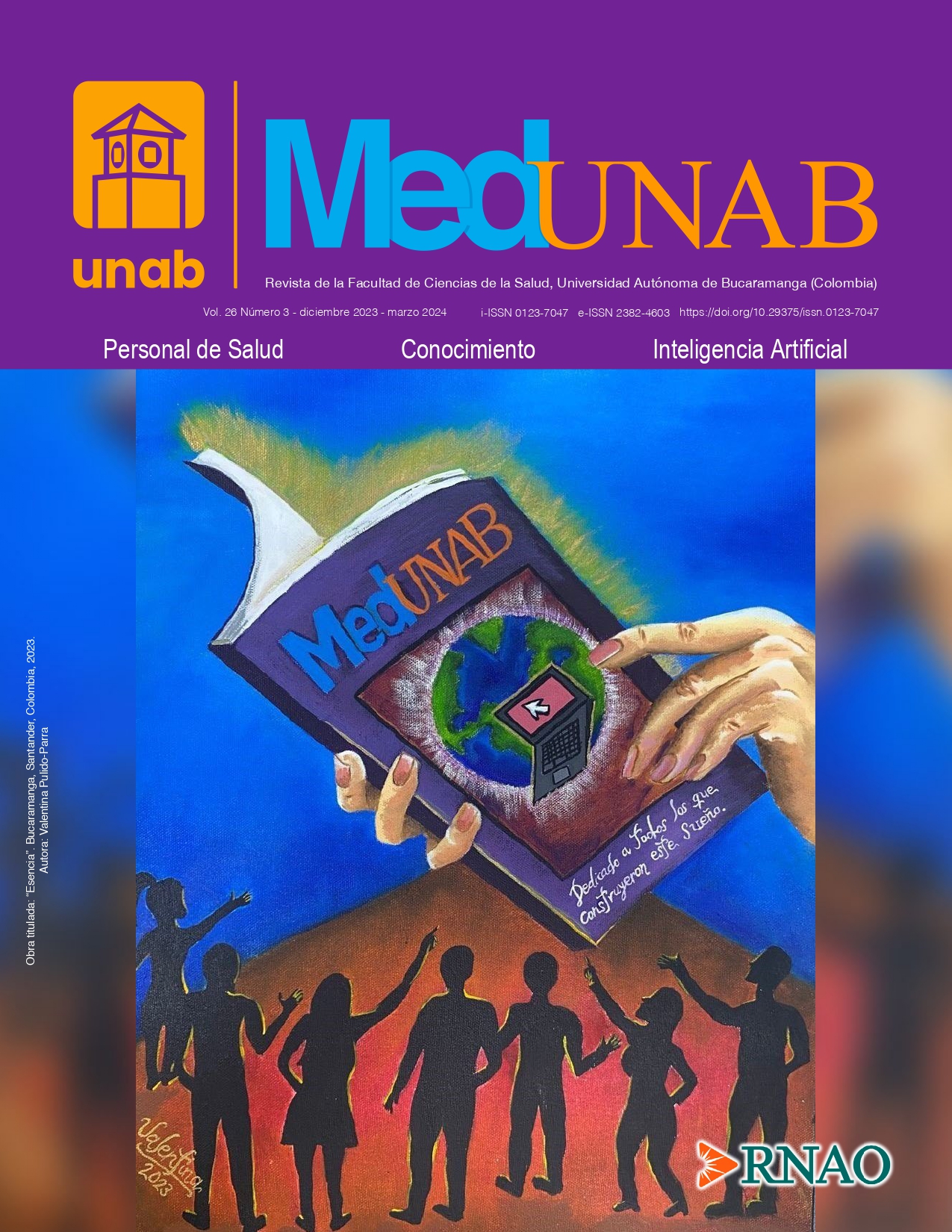Consideraciones o efecto del estado de aislamiento en adultos mayores durante la pandemia del COVID-19
Resumen
Introducción. El aislamiento social permitió la mitigación de casos por la COVID-19, enfermedad que impactó tanto físico como emocional y mentalmente a la población en general, pero específicamente a los adultos mayores. Se identificó que el aislamiento social se asoció con un aumento del 50% del riesgo de demencia y otras afecciones graves. La presente revisión pretende identificar el conocimiento científico que se ha construido a partir del fenómeno del aislamiento social en las personas mayores como medida de prevención de la COVID-19. Metodología. Revisión integrativa de la literatura. La estrategia de búsqueda: bases de datos Web of Science, Medline, SCOPUS, EMBASE, CINAHL; tesauros MeSH y Emtree: “loneliness”, “elderly”, “Aged”, “Isolating”, “Social Isolation”, “COVID-19” y “Coronavirus Infections”. Criterios de inclusión: investigaciones primarias y secundarias, con texto completo disponible en línea, idiomas: inglés, español, portugués y francés entre los años 2015 al 2021. Resultados. Se incluyeron 27 artículos científicos entre los cuales se encuentran estudios descriptivos transversales y longitudinales, así como revisiones narrativas y sistemáticas, los cuales daban respuesta al objetivo de la revisión. Discusión. En la literatura encontrada diferentes autores resaltan la importancia de reconocer el aislamiento social como una situación de salud pública, que tiene repercusiones mentales, sociales y físicas en la población mayor. Conclusiones. La revisión realizada permite identificar el conocimiento generado a partir del concepto de aislamiento en la persona mayor, reconocer las repercusiones a nivel mental de este aislamiento (especialmente en aquellas personas mayores con antecedentes), y comprender el abordaje interdisciplinario que se requiere.
Referencias bibliográficas
Rivillas JC, Gómez-Aristizabal L, Rengifo-Reina HA, Muñoz-Laverde EP. Envejecimiento poblacional y desigualdades sociales en la mortalidad del adulto mayor en Colombia. Rev Fac Nac Salud Pública [Internet]. 2017;35(3):369–81. doi: https://doi.org/10.17533/udea.rfnsp.v35n3a07
Organización Mundial de la Salud (OMS). Informe mundial sobre el envejecimiento y la salud [Internet]. Reino Unido:OMS;2015. Recuperado a partir de: https://www.who.int/es/publications/i/item/9789241565042
Bonilla-Aldana DK, Villamil-Gómez WE, Rabaan AA, Rodríguez-Morales AJ. A new viral zoonosis of global concern: Coronavirus COVID-19 disease in 2019. Iatreia [Intranet]. 2020;33(2):107–10. Recuperado a partir de: http://www.scielo.org.co/scielo.php?script=sci_arttext&pid=S0121-07932020000200107
Huarcaya-Victoria J. Consideraciones sobre la salud mental en la pandemia de COVID-19. Rev Peru Med Exp Salud Publica [Internet]. 2020;37(2):327–34. doi: https://doi.org/10.17843/rpmesp.2020.372.5419
Organización Panamericana de la Salud. Reporte de situación COVID-19 Colombia No. 272 - 19 de mayo de 2022. [Internet] Buenos Aires:OPS;2022. Recuperado a partir de: https://www.paho.org/es/reportes-situacion-covid-19-colombia
Instituto Nacional de Salud. COVID-19 en Colombia [Internet]. Colombia:INS;2022. Recuperado a partir de: https://www.ins.gov.co/Noticias/Paginas/coronavirus-personal-salud.aspx
Huenchuan S, Yanes-Rizo PE, Negrete-Rovira MC. COVID-19: Recomendaciones generales para la atención a personas mayores desde una perspectiva de derechos humanos [Internet]. México:CEPAL;2020. Recuperado a partir de: www.cepal.org/apps
Centers for Disease Control and prevention CDC. COVID-19 [Internet]. Estados Unidos:CDC;2020. Recuperado a partir de: https://espanol.cdc.gov/coronavirus/2019-ncov/index.html
Ministerio de Salud y Protección Social. Prevención, contención y mitigación del COVID-19 en personas adultas mayores [Internet]. Colombia:MinSalud;2020. Recuperado a partir de: https://www.minsalud.gov.co/salud/publica/PET/Documents/Infografi%CC%81a%20Adultos%20mayores.pdf
de Leo D, Trabucchi M. COVID-19 and the fears of italian senior citizens. Int J Environ Res Public Health [Internet]. 2020;17(10):3–7. doi: https://doi.org/10.3390/ijerph17103572
Gené-Badia J, Comice P, Belchín A, Erdozain MÁ, Cáliz L, Torres S, et al. Perfiles de soledad y aislamiento social en población urbana. Aten Primaria [Internet]. 2020;52(4):224–32. doi: https://doi.org/10.1016/j.aprim.2018.09.012
Camargo-Rojas CM, Chavarro-Carvajal DA. El sentimiento de soledad en personas mayores: conocimiento y tamización oportuna. Univ Med [Internet]. 2020;61(2). doi: https://doi.org/10.11144/Javeriana.umed61-2.essm
Beutel ME, Klein EM, Brähler E, Reiner I, Jünger C, Michal M, et al. Loneliness in the general population: Prevalence, determinants and relations to mental health. BMC Psychiatry. 2017;17(97):1–8. doi: https://doi.org/10.1186/s12888-017-1262-x
Chaparro-Díaz L, Carreño-Moreno S, Arias-Rojas M. Soledad en el adulto mayor: implicaciones para el profesional de enfermería. Rev Cuid [Internet]. 2019;10(2):1–11. doi: https://doi.org/10.15649/cuidarte.v10i2.633
Quintero Á, Henao ME, Villamil MM, León J. Cambios en la depresión y el sentimiento de soledad después de la terapia de la risa en adultos mayores internados. Biomedica [Internet]. 2015;35(1):90–100. doi: https://doi.org/10.7705/biomedica.v35i1.2316
National Academies of Sciences, Engineering, and Medicine. Social isolation and loneliness in older adults: Opportunities for the health care system [Internet]. Washington, DC:The National Academies Press;2020. doi: https://doi.org/10.17226/25663
Qiu J, Shen B, Zhao M, Wang Z, Xie B, Xu Y. A nationwide survey of psychological distress among Chinese people in the COVID-19 epidemic: implications and policy recommendations. Gen Psychiatry [Internet]. 2020;33(2):e100213. doi: https://doi.org/10.1136/gpsych-2020-100213
Ahmed MZ, Ahmed O, Aibao Z, Hanbin S, Siyu L, Ahmad A. Epidemic of COVID-19 in China and associated Psychological Problems. Asian J Psychiatr [Internet]. 2020;51:102092. doi: https://doi.org/10.1016/j.ajp.2020.102092
Fatke B, Hölzle P, Frank A, Förstl H. Psychische Probleme in der Pandemie – Beobachtungen während der COVID-19-Krise. DMW - Dtsch Medizinische Wochenschrift [Internet]. 2020;145(10):675–81. doi: https://doi.org/10.1055/a-1147-2889
Petitte T, Mallow JA, Barnes ER, Petrone A, Barr T, Theeke LA. A Systematic Review of Loneliness and Common Chronic Physical Conditions in Adults. Open Psychol J. 2015;8(Suppl 2):113–32. doi: https://doi.org/10.2174/1874350101508010113
Whittemore R, Knafl K. The integrative review: updated methodology. J Adv Nurs [Internet]. 2005;52(5):546–53. doi: https://doi.org/10.1111/j.1365-2648.2005.03621.x
Ong AD, Uchino BN, Wethington E. Loneliness and Health in Older Adults: A Mini-Review and Synthesis. Gerontology [Internet]. 2016;62(4):443–9. doi: https://doi.org/10.1159/000441651
Shankar A, McMunn A, Demakakos P, Hamer M, Steptoe A. Social isolation and loneliness: Prospective associations with functional status in older adults. Heal Psychol [Internet]. 2017;36(2):179–87. doi: https://doi.org/10.1037/hea0000437
Gené-Badia J, Ruiz-Sánchez M, Obiols-Masó N, Oliveras-Puig L, Lagarda-Jiménez E. Aislamiento social y soledad: ¿qué podemos hacer los equipos de atención primaria? Aten Primaria [Internet]. 2016;48(9):604–9. doi: https://doi.org/10.1016/j.aprim.2016.03.008
Mehra A, Rani S, Sahoo S, Parveen S, Singh AP, Chakrabarti S, et al. A crisis for elderly with mental disorders: Relapse of symptoms due to heightened anxiety due to COVID-19. Asian J Psychiatr [Internet]. 2020;51:102114. doi: https://doi.org/10.1016/j.ajp.2020.102114
Donovan NJ. Timely Insights Into the Treatment of Social Disconnection in Lonely, Homebound Older Adults. Am J Geriatr Psychiatry [Internet]. 2020;28(7):709–11. doi: https://doi.org/10.1016/j.jagp.2020.04.002
Santini ZI, Jose PE, York-Cornwell E, Koyanagi A, Nielsen L, Hinrichsen C, et al. Social disconnectedness, perceived isolation, and symptoms of depression and anxiety among older Americans (NSHAP): a longitudinal mediation analysis. Lancet Public Health [Internet]. 2020;5(1):e62–70. doi: https://doi.org/10.1016/S2468-2667(19)30230-0
Lei L, Huang X, Zhang S, Yang J, Yang L, Xu M. Comparison of Prevalence and Associated Factors of Anxiety and Depression Among People Affected by versus People Unaffected by Quarantine During the COVID-19 Epidemic in Southwestern China. Med Sci Monit [Internet]. 2020;26:e924609. doi: https://doi.org/10.12659/MSM.924609
Rajkumar RP. COVID-19 and mental health: A review of the existing literature. Asian J Psychiatr [Internet]. 2020;52:102066. doi: https://doi.org/10.1016/j.ajp.2020.102066
Frances-Wand AP, Zhong BL, Kum-Chiu HF, Draper B, De Leo D. COVID-19: the implications for suicide in older adults. Int Psychogeriatrics [Internet]. 2020;32(10):1225-30. doi: https://doi.org/10.1017/S1041610220000770
Gao J, Zheng P, Jia Y, Chen H, Mao Y, Chen S, et al. Mental health problems and social media exposure during COVID-19 outbreak. PLoS One [Internet]. 2020;15(4):e0231924. doi: https://doi.org/10.1371/journal.pone.0231924
Jawaid A. Protecting older adults during social distancing. Science [Internet]. 2020;368(6487):145.1-145. doi: https://doi.org/10.1126/science.abb7885
MacLeod S, Tkatch R, Kraemer S, Fellows A, McGinn M, Schaeffer J, et al. COVID-19 Era Social Isolation Among Older Adults. Geriatrics [Internet]. 2021;6(2):52. doi: https://doi.org/10.3390/geriatrics6020052
Rivera-Torres S, Mpofu E, Jean-Keller M, Ingman S. Older Adults’ Mental Health Through Leisure Activities During COVID-19: A Scoping Review. Gerontol Geriatr Med [Internet]. 2021;7. doi: https://doi.org/10.1177/23337214211036776
Gerst-Emerson K, Jayawardhana J. Loneliness as a Public Health Issue: The Impact of Loneliness on Health Care Utilization Among Older Adults. Am J Public Health [Internet]. 2015;105(5):1013–9. doi: https://doi.org/10.2105/AJPH.2014.302427
Armitage R, Nellums LB. COVID-19 and the consequences of isolating the elderly. Lancet Public Health [Internet]. 2020;5(5):e256. doi: https://doi.org/10.1016/S2468-2667(20)30061-X
Tyler CM, McKee GB, Alzueta E, Perrin PB, Kingsley K, Baker FC, et al. A study of older adults’ mental health across 33 countries during the COVID-19 pandemic. Int J Environ Res Public Health [Internet]. 2021;18(10):5090. doi: https://doi.org/10.3390/ijerph18105090
Bermeja AI, Ausín B. Programas para combatir la soledad en las personas mayores en el ámbito institucionalizado: una revisión de la literatura científica. Rev Esp Geriatr Gerontol [Internet]. 2018;53(3):155–64. doi: https://doi.org/10.1016/j.regg.2017.05.006
Duan L, Zhu G. Psychological interventions for people affected by the COVID-19 epidemic. The Lancet Psychiatry [Internet]. 2020;7(4):300–2. doi: https://doi.org/10.1016/S2215-0366(20)30073-0
Fan Q. Utilizing ICT to prevent loneliness and social isolation of the elderly. A literature review. Cuad Trab Soc [Internet]. 2016;29(2):185–200. doi: https://doi.org/10.5209/CUTS.51771
Noone C, McSharry J, Smalle M, Burns A, Dwan K, Devane D, et al. Video calls for reducing social isolation and loneliness in older people: a rapid review. Cochrane Database Syst Rev [Internet]. 2020;5. doi: https://doi.org/10.1002/14651858.CD013632
Martins-Van Jaarsveld G. The Effects of COVID-19 Among the Elderly Population: A Case for Closing the Digital Divide. Front Psychiatry [Internet]. 2020;11:1–7. doi: https://doi.org/10.3389/fpsyt.2020.577427
Irmak AY, Çelikkalp Ü, Ekuklu G. Evaluation of the chronic disease management and depression levels of people over 65 years of age during the COVID-19 pandemic period. Perspect Psychiatr Care [Internet]. 2020. doi: https://doi.org/10.1111/ppc.12706
Chen Y, Feeley TH. Social support, social strain, loneliness, and well-being among older adults: An analysis of the Health and Retirement Study*. J Soc Pers Relat [Internet]. 2014;31(2):141–61. doi: https://doi.org/10.1177/0265407513488728
Hao F, Tan W, Jiang L, Zhang L, Zhao X, Zou Y, et al. Do psychiatric patients experience more psychiatric symptoms during COVID-19 pandemic and lockdown? A case-control study with service and research implications for immunopsychiatry. Brain Behav Immun [Internet]. 2020;87:100–6. doi: https://doi.org/10.1016/j.bbi.2020.04.069
Ayşegül I, Sebahat G. Integrative Nursing and Omaha System–Based Nursing Care Interventions in Older Women Feeling Loneliness (INOSEL): Study Protocol for a Randomized Controlled Trial. J Holist Nurs [Internet]. 2020;39(3):225-238. doi: https://doi.org/10.1177/0898010120979128
Descargas
Derechos de autor 2023 MedUNAB

Esta obra está bajo una licencia internacional Creative Commons Atribución-NoComercial 4.0.
| Estadísticas de artículo | |
|---|---|
| Vistas de resúmenes | |
| Vistas de PDF | |
| Descargas de PDF | |
| Vistas de HTML | |
| Otras vistas | |
































